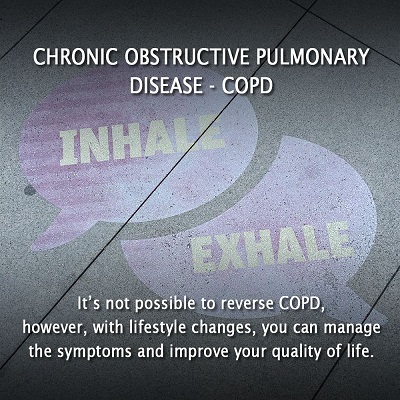 Chronic Obstructive Pulmonary Disease (COPD) is a chronic inflammation of the lungs that makes it hard to breathe. It is usually caused by cigarette smoking and exposure to secondhand smoke, chemicals, fumes, and irritants. Asthma and genetics are also risk factors.
Chronic Obstructive Pulmonary Disease (COPD) is a chronic inflammation of the lungs that makes it hard to breathe. It is usually caused by cigarette smoking and exposure to secondhand smoke, chemicals, fumes, and irritants. Asthma and genetics are also risk factors.
When you have COPD, you may experience shortness of breath, a chronic cough, wheezing, respiratory infections, chest tightness, phlegm, fatigue, and more. If it is not prevented or managed, COPD can lead to various health complications, such as heart disease and lung cancer.
COPD can be debilitating as it prevents you from doing things you would like to do in your life. Although you can’t cure it, there are ways to manage COPD symptoms with a few lifestyle changes. Here are some ways to do that.
Quit Smoking & Learn Breathing Techniques
Cigarette smoking and exposure to secondhand smoke are the biggest culprits of COPD. Tobacco smoke damages your lungs. If you’ve been smoking for years, it’s time to quit, especially if you want to improve your COPD symptoms. You’ll live longer if you quit smoking too!
If you’ve been a long-term smoker, it’s understandable that you will find it challenging to quit. But it’s not impossible. Seek professional help and join programs that will help you quit the addiction.
As breathing is hard when you have COPD, you need to learn techniques that will ease your shortness of breath. Diaphragmatic breathing and pursed-lip breathing are breathing retraining techniques that can help you breathe more efficiently and comfortably.
Maintain a Normal Weight by Modifying Your Eating Habits & Exercising
When you are overweight, it’s harder to breathe and your heart and lungs can work double time. Try to maintain a normal weight by doing light exercises that you can manage and eating healthy foods.
Your eating habits can affect your breathing. Don’t make yourself too full because it will make breathing uncomfortable. What you can do is eat smaller portions several times a day. You should also eat slowly to ease your breathing.
Ensure that you eat lots of fruits and vegetables. Avoid foods that are high in saturated fats and sugar. Cut back on red meats and limit processed foods. Eating healthily will ensure you get the nutrition that you need, which will boost your immune system.
Engage in regular physical activities and practice your breathing. Exercises such as walking and breathing exercises can help strengthen your chest and make it easier for you to breathe. They’re easy and won’t put a strain on your lungs. Getting active will build your endurance and improve your general well-being.
Manage Your Mental Health
This is a double-edged sword, as COPD increases your chances of having depression or anxiety, and depression and anxiety can exacerbate your shortness of breath. Learning relaxation techniques such as meditation can help you. Don’t hesitate to talk to your doctor or find a support group when you’re having a hard time emotionally. Take care of yourself, first and foremost.
Improve Air Quality At Home & Change Your Work Environment
Too much cold air or hot air is not good for you if you have COPD, so having an air conditioning system at home can help. Keep the humidity low, regularly change air filters, and ensure that you have enough ventilation at home.
If your work exposes you to irritants, chemicals, and harmful fumes, you definitely need to consider changing work. You can also talk to your employer about extra protection, such as giving you respiratory equipment at work.
It’s difficult if you have chronic obstructive pulmonary disease, and it’s currently not possible to reverse its effects. However, with lifestyle changes, you can make the symptoms less impacting and improve your quality of life. Don’t hesitate to talk to your doctor and seek support from family and friends!






